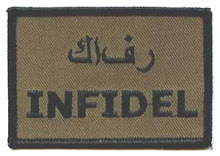Here is a great little story exposing the truth about Islam's intolerance of criticism. Everyone knows this, but few will vocalize it. Christianity is fair game for criticism because the critics have nothing to fear from Christians. But critics of Islam have to fear for their lives as the practitioners of the "Religion of Peace" will not tolerate any criticism.
__________________
The following story can be found at:
The Untold Story of Islam
Author Tom Holland shook the Islamic world early this year with his book
In the Shadow of the Sword. Now, he has taken his book and turned it onto a documentary of sorts called
Islam: The Untold Story. Holland has the temerity to question whether Islam is legitimate based on textual criticism of its own book, the Koran.
To begin with, Holland compared the surviving documentary evidence of the birth of Islam with the actual text of the Koran and found several discrepancies. This is actually nothing new. Scholars have been finding supposed contradictions between the biblical text and documentary evidence for centuries. But Holland does not necessarily have an axe to grind with Islam. He is not, as many liberal scholars are intending to do with the Bible, trying to disprove the Koranic text; he is simply asking questions and trying to get down to the heart of the matter.
However, Islamic scholars who actually believe the Koran is reliable completely discount anything Holland has to say. When Holland asks a professor of Islamic Studies at George Washington University if a non-Muslim can understand the origins of the Muslim world, the simple reply is “no.” Holland’s own admitted non-attachment to the Islamic religion immediately disqualifies him from being able to answer the basic questions he is asking. Like a private club, Muslim scholars have little time or patience for interlopers like Holland. Their minds are made up already.
But would it even matter if Holland was a Muslim himself? The answer seems to be self-evident. If they are unwilling to listen to an outsider, or even acknowledge that his research is worth looking into, why should they accept the findings of a “heretic” inside the camp? Anyone, whether from within or without, who dares to question the legitimacy of the Koran, will be treated as an outsider and therefore, easily dismissed as unqualified. The system is closed. Denying or even questioning the Koran is grounds for being disregarded and ignored. A
British reviewer of the documentary had this to say:
Herein lay another parallel story that was seldom far from the surface but which remained steadfastly untold. For decades – centuries even – scholars have felt free to contest the accuracy of other religious texts. Not least the Bible; what’s true, what’s parable and what’s just wishful thinking has all been up for grabs without any serious damage being done to Christian beliefs. Not so with Islam, around which non-Islamic scholars tread with extreme caution. I’m all for cultural and religious sensitivity, but the degree to which Holland tiptoed around the subject and apologised for his findings went way beyond what was required. Or would have been on offer for any other religion. It was almost as if he was looking over his shoulder, half expecting a fatwa at any minute.
And this is the real story with Islam. No one—researcher, journalist, or seeker—doubts that Muslims take their religion seriously, very seriously. So seriously, in fact, that apologies are often the first and last thing offered any time someone has the guts to ask questions about the religion—where it came from, who Muhammad was, what he did, etc. Scholars can feel free to rip the Bible to shreds and still sleep comfortably at night, but this is not the case with Islam. Anyone, even author/historians, must constantly reassure Muslims that they are not implying anything “true” when they question the Islamic religion, or its founder, or its truth claims because there is always a spirit of fear associated with Islam. And this is precisely why the professor at GWU was quite forthcoming in his answer: Anyone is free to investigate the origins of Islam, just don’t expect to be taken as being credible. The only “true” Islamic scholar is the one who says the Koran is correct in all it teaches. The Koran is true because the Koran is true; if it was good enough for Muhammad, it’s good enough for modern Muslims.

No comments:
Post a Comment